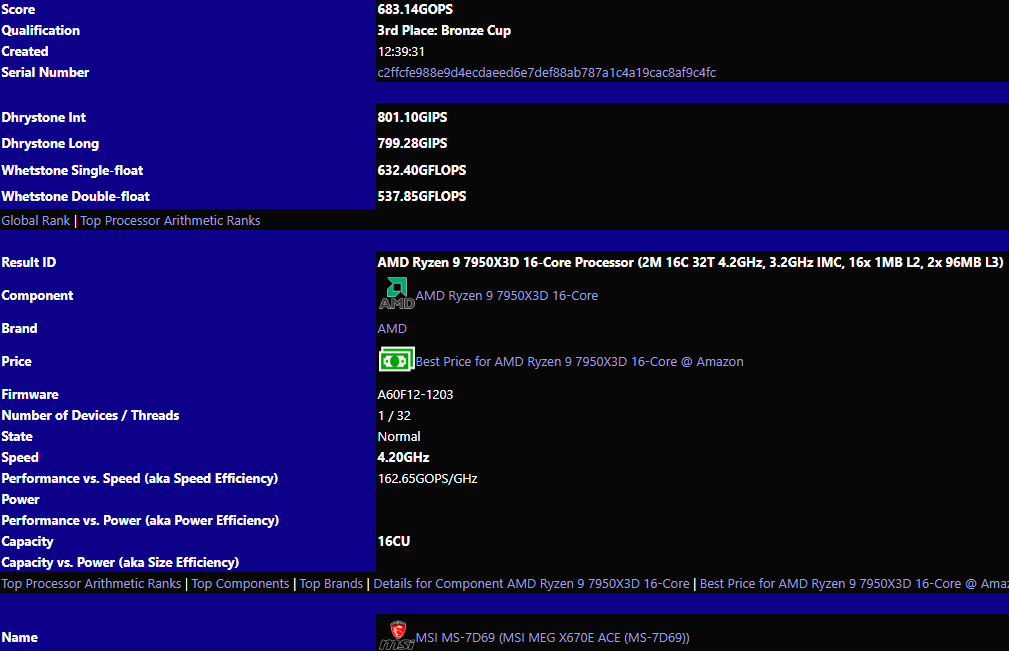AMD's Ryzen 9 7950X3D sneaks into performance databases of popular benchmark suites.
AMD Ryzen 9 7950X3D Tested in Blender, Geekbench 5 : Read more
AMD Ryzen 9 7950X3D Tested in Blender, Geekbench 5 : Read more
"Of course, we cannot draw accurate conclusions based on test results from one or two pre-production systems "

So now the glaring weakness of thee 5800X3D is resolved: You no longer have to give up have your productivity performance, you only sacrifice a little. These results are amazing, and it's weird they making it sound like it's bad with words like 'unimpressed'.
Now the question is did they solve part 2: Is the 7950X3D as big an improvement in gaming as the 5800X3D was.
I suspect that's just as much to do with the fact that AMD realised they didn't need to put oodles of voltage through their CPUs after all. You run your 7950X in ECO mode and will probably be equally happy.Also, the deficit in multi-core performance is to be expected considering the Ryzen 9 7950X3D doesn't has a lot of voltage or the thermal headroom to work with as the standard non-3D CPUs.
So now the glaring weakness of thee 5800X3D is resolved: You no longer have to give up have your productivity performance, you only sacrifice a little. These results are amazing, and it's weird they making it sound like it's bad with words like 'unimpressed'.
Now the question is did they solve part 2: Is the 7950X3D as big an improvement in gaming as the 5800X3D was.
I disagree. Something that wasn't cache-limited on Zen 3 still probably won't be cache-limited on Zen 4. While Zen 4 has more IPC, DDR5 does a much better job of feeding it.Many things are different than the last one, so we can't even safely extrapolate by just comparing 5800x to 5800x3D
Isn't PBO limited to the die without the extra cache?The new ones can do PBO
Indeed but these things might not offset each other in a linear manner to make a good guess. And since DDR5 might feed the cpu better, the extra cache's help might not be as pronounced as it is with the 5800x3dI disagree. Something that wasn't cache-limited on Zen 3 still probably won't be cache-limited on Zen 4. While Zen 4 has more IPC, DDR5 does a much better job of feeding it.
Is it? It's available for the 7800x3d so why wouldn't it be available for both 79xx dies?Isn't PBO limited to the die without the extra cache?
I think not everyone lives in the US and even there, not all cities have a Microcenter.Thoughts?
Well, a lot of people don't really care if it's not the best value. If it can deliver most of the benefits of the 5800X3D without most of the downsides, then it'll sell well enough. That's what AMD seems to be counting on. I think it's a somewhat risky bet, and I expect a lot of gamers will still prefer the 7800X3D.For the price of one 7900x 3d today ...
Interconnects and speed (+ latency). If you put the extra cache there, the amount of latency and interconnects you'd need will blow the packaging cost, I'm sure. Plus, it wouldn't be L3 cache anymore. Probably more like ERAM or HBM.Well, a lot of people don't really care if it's not the best value. If it can deliver most of the benefits of the 5800X3D without most of the downsides, then it'll sell well enough. That's what AMD seems to be counting on. I think it's a somewhat risky bet, and I expect a lot of gamers will still prefer the 7800X3D.
I'm finding myself wondering why they didn't enable cache stacking on the I/O die. I guess that won't really help with EPYC, but it seems like somewhere you could put extra L3 (or L4) without the clock speed tradeoffs.
They already have high-bandwidth interconnects between the CCD and IOD, because every time a CCD gets a cache miss, it needs to snoop & potentially fetch the cacheline from other CCD. According to this, Zen 4 beefed up the bandwidth to about 1.5 TB/s:Interconnects and speed (+ latency).

No, you probably wouldn't move all your L3 there, but I did offer that it could be L4.Plus, it wouldn't be L3 cache anymore. Probably more like ERAM or HBM.

